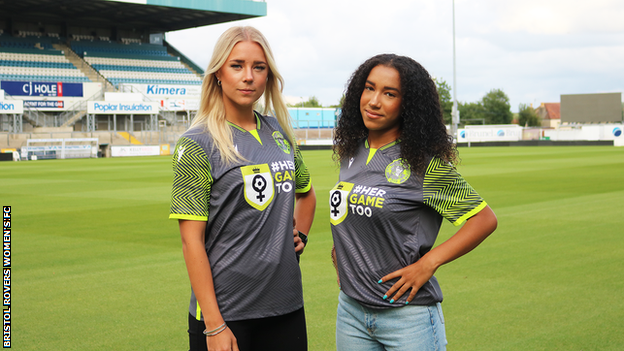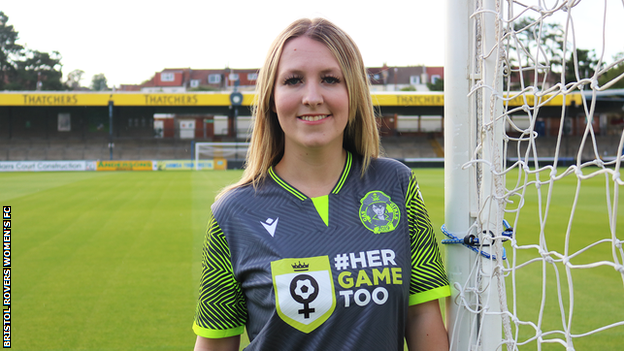Her Game Too: The campaign to tackle sexism within football
- Published

Bristol Rovers women's team will wear the Her Game Too away kit this season
When Bristol Rovers fans Lucy Ford and Caz May began speaking to other female football fans, they quickly realised the abuse they had experienced both online and in person, for simply being women who like football, was a much more widespread issue.
It is why the duo, along with 10 other female football supporters, decided to launch the Her Game Too campaign earlier this year to combat sexism within the sport.
The message they are promoting is a simple one: to foster a positive, inclusive environment in football, while raising awareness and educating others about the abuse women who follow football regularly face.
Now, a little over three months after launching their first video, the Her Game Too message is being backed by clubs such as Swansea City, Exeter City, Tranmere Rovers, Newport County, Yeovil Town and Grimsby Town, as well as May and Ford's own team Bristol Rovers.
Already they have seen their slogan plastered over advertising boarding at grounds on match day, inside programmes, and on the front of Bristol Rovers women's new away kit.
"I've had it [abuse] since I was in secondary school. I've been a big football fan since I was 10 years old and I've had it in school where guys and even teachers would say to me 'why are you a football fan, why are you spending your weekends doing that?'," Ford told BBC Points West.
"I think a lot of female fans didn't feel like they were perhaps able to speak up about it, maybe a bit more shy or felt they didn't want to speak up because they might get loads of people saying it's not true, or saying comments that are really unfair to them," she continued.
"But it wasn't until our campaign actually came to fruition and we did our survey that it highlighted the real problems."

Her Game Too co-founder Lucy Ford is a long-time Bristol Rovers fan
The Her Game Too survey of almost 400 female fans this August returned some shocking stories. Many reported incidents of having their knowledge of football and reasons for watching the sport questioned, while many others told of being harassed and intimidated.
"Prior to the campaign I was aware that there were issues around abuse of females within the game but we weren't aware of the scale of what was happening," said Adam Tutton, chief executive of Bristol Rovers Community Trust.
"When the girls brought that to our attention I think all of us at the community trust and at the football club were really, really shocked and felt we needed to do all we could to support them."
Bristol Rovers were one of the first clubs to partner with the campaign, and the idea to include Her Game Too on the Gas Girls' away kit, they say, was an easy decision.
Inclusion and making everyone welcome are two key areas for the trust, Tutton said. Last year the team, created by the trust in 2019, wore a special edition away kit in partnership with Bristol Pride.
Allow X content?
This article contains content provided by X. We ask for your permission before anything is loaded, as they may be using cookies and other technologies. You may want to read X’s cookie policy, external and privacy policy, external before accepting. To view this content choose ‘accept and continue’.
"It's an honour, to be honest," said Rovers defender Alva Lang of the new kit. "It is something that we all stand for and it is something that we do want to support, and so to be a massive part of the campaign means a lot to all of us.
"I think pretty much everyone that I know that plays football has had some kind of experience of sexism within the sport, which is really sad, both as a supporter but also as a participant. So it definitely is something we do need to talk about and address."
Rovers midfielder Libby Bell agrees: "I think most women in football have had the odd comment shouted at them, either while training or if you go to support Rovers at the Mem (Memorial Stadium). I think everyone's had a weird look, or when you're playing football they've made a comment.
"It's very common and it's something we want to stamp out of the game."
Ford says the fact the Her Game Too message has gained momentum so quickly highlights the fact that the sexism they talk about is such a widespread issue across the whole country.
Ultimately, though, the message is a positive one. Their first ambition was to get one club to partner with them, and with that aim very much achieved, they now just want to keep spreading it as far as they can.
"That's really what it's about, it's about inspiring the next generation of female football fans, female footballers," Ford said. "And just saying that, you know, you should be allowed to be a female football fan, a female footballer, without being told that you shouldn't because you're a female."